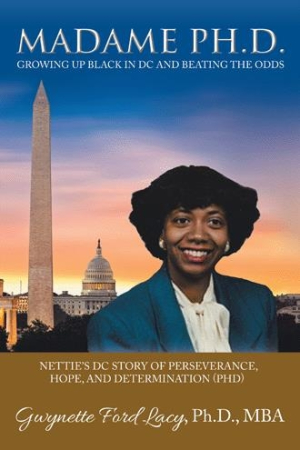Madame PhD
Growing Up Black in DC and Beating the Odds: Nettie’s DC Story of Perseverance, Hope, and Determination (PHD)
Madame PhD is about achieving success despite the hardships brought about by race and economic class.
Gwynette Ford Lacy’s memoir Madame PhD is about defeating the odds and following dreams of academic success.
Lacy grew up underprivileged in the 1960s and 1970s—a Black girl in Washington, DC, who wanted to obtain a PhD from a prestigious university. Drawing on her own perseverance, hope, and determination, she pressed on despite being bullied in school for being smart. The book intones that no matter how smart you are or how hard you try to do what’s right, “you will get knocked down and life will kick you around.”
Still, Lacy kept pursuing her goals. In time, she became the first Black woman to earn a PhD from the University of Wisconsin-Madison in the specialized field of industrial relations. She was also the first Black woman with a PhD to be tenured and become the chair of the Department of Management in the School of Business at Howard University. Later, she worked as a consultant, trainer, and motivational speaker.
While the book is inspiring as it recounts Lacy’s struggles, it is also repetitive and didactic to excess. In its introduction, it details what a PhD is, including who can obtain one and how, but these explanations of rigid academic structures are mechanical. Here and elsewhere, the prose is dry and distancing. Whole chapters are dominated by lists of Lacy’s academic achievements, free from reflections or enlivening anecdotes.
The book does a better job of addressing issues including racism and gender inequality: for Lacy, other people’s prejudices impacted her even before they met her in person. She notes that some people, when reading her last name, assumed that she was Irish or French, but “when an African American woman shows up, they are often a little surprised.” She experienced racism and sexism in the classroom, too, with a teacher refusing to learn her name and favoring boys, especially in subjects considered “more masculine,” like math.
Beyond Lacy’s own story, the book makes forceful appeals to people of similar economic and racial backgrounds, encouraging readers to follow their visions and chase their dreams. Some truisms are involved in this work. But these general encouragements are an awkward fit with the book’s more personal, esoteric elements, as with its extensive picture gallery, which features most of the places mentioned in the book as well as relevant newspaper articles and yearbook photographs.
Madame PhD is about achieving success despite the hardships brought about by race and economic class.
Reviewed by
Anna Maria Colivicchi
Disclosure: This article is not an endorsement, but a review. The publisher of this book provided free copies of the book and paid a small fee to have their book reviewed by a professional reviewer. Foreword Reviews and Clarion Reviews make no guarantee that the publisher will receive a positive review. Foreword Magazine, Inc. is disclosing this in accordance with the Federal Trade Commission’s 16 CFR, Part 255.

